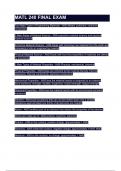Exam (elaborations)
MATL 240 FINAL EXAM Questions with 100% Actual correct answers | verified | latest update | Graded A+ | Already Passed | Complete Solution
- Course
- Institution
MATL 240 FINAL EXAM Questions with 100% Actual correct answers | verified | latest update | Graded A+ | Already Passed | Complete Solution
[Show more]



